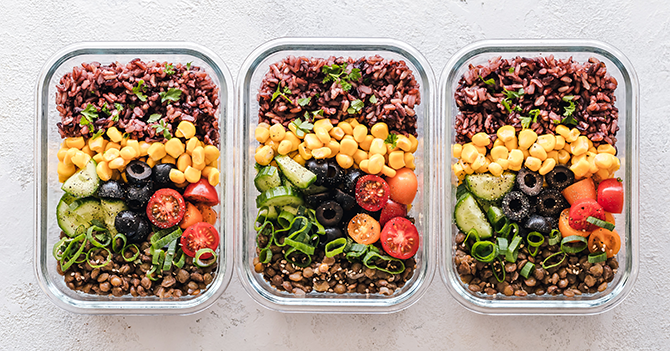Best Brands for Gluten Free BBQ Sauce in Houston
Everything About Healthy And Balanced Food: Advantages of Checking Out Plant Based Alternatives
The discussion bordering plant-based diet plans has actually acquired considerable attention over the last few years. Numerous individuals are discovering the prospective health advantages, nutritional advantages, and environmental influences related to these dietary selections. As individuals become a lot more knowledgeable about their food's influence on health and sustainability, concerns develop regarding the functionalities of adopting such a lifestyle. What specific adjustments can one anticipate, and just how might these selections reshape not only individual health and wellness but also the world's future?
Understanding Plant-Based Diet Plans
Although many individuals connect plant-based diets generally with vegetarianism or veganism, these diet regimens can include a vast array of consuming patterns that focus on whole, minimally processed plant foods. Such diet plans commonly include fruits, veggies, entire grains, vegetables, nuts, and seeds, while getting rid of or limiting animal items. This versatility permits individuals to tailor their nutritional selections according to nutritional needs and individual preferences. Some might adopt a largely plant-based diet while still occasionally consuming meat or milk, frequently referred to as a flexitarian technique. The focus continues to be on integrating even more plant foods, which can result in a diverse selection of meals and flavors. Comprehending these numerous analyses of plant-based consuming is essential for valuing its access and charm in contemporary food society.
Wellness Conveniences of Plant-Based Foods
The health and wellness benefits of plant-based foods are substantial, using a nutrient density advantage that sustains general health. Research study shows that these foods can enhance heart health and play a crucial role in reliable weight management. By including more plant-based options, people might boost their nutritional selections and advertise long-lasting wellness.
Nutrient Density Benefit
Nutrient density plays an essential role in the health benefits of plant-based foods, making them a compelling selection for those looking for a balanced diet regimen. Plant-based foods, such as fruits, veggies, beans, nuts, and entire grains, are often abundant in crucial vitamins, minerals, and antioxidants while being lower in calories. This high nutrient density allows people to consume less calories while still fulfilling their dietary needs. In addition, these foods are loaded with dietary fiber, promoting digestion health and wellness and helping in weight management. By integrating nutrient-dense plant-based alternatives, customers can boost their general health, sustain their immune systems, and minimize the risk of persistent diseases. Ultimately, the nutrient thickness of plant-based foods highlights their relevance in a health-conscious lifestyle.
Heart Health And Wellness Renovation

Weight Monitoring Support
In enhancement to advertising heart health, a plant-based diet can significantly assist in weight monitoring. This dietary method emphasizes entire foods such as fruits, veggies, vegetables, nuts, and entire grains, which are generally reduced in calories and higher in fiber contrasted to animal-based items. The high fiber content aids boost satiety, lowering overall calorie intake. Moreover, plant-based diet regimens are commonly rich in important nutrients while low in unhealthy fats, making it simpler to preserve a healthy and balanced weight. Plant Based Chicken. Research shows that individuals who embrace a plant-based way of life often tend to have lower body mass indexes (BMIs) and experience more successful weight management contrasted to those that consume meat-heavy diet plans. Consequently, embracing plant-based alternatives is a critical selection for reliable weight management
Nutritional Worth of Plant-Based Ingredients
Plant-based active ingredients are rich in vital nutrients, offering a varied selection of vitamins, minerals, and anti-oxidants that add to overall wellness. A contrast of healthy protein sources exposes that while pet products are often considered as remarkable, lots of plant-based options supply adequate protein and other helpful substances. Comprehending the nutritional value of these active ingredients can help people make informed nutritional options.
Essential Nutrients in Plants
Nutrient-rich ingredients found in plants provide a varied array of vital vitamins and minerals that contribute substantially to general wellness. These components are abundant in vitamins A, C, and K, which sustain immune feature, vision, and blood clot, respectively. Furthermore, plants provide vital minerals such as potassium, calcium, and magnesium, important for heart health, muscular tissue feature, and bone strength. The presence of fiber in plant-based foods aids food digestion and advertises a healthy and balanced gut microbiome. Anti-oxidants, discovered generously in vegetables and fruits, help fight oxidative tension and lower swelling. Furthermore, several plant foods are reduced in calories yet high in nutrients, making them an exceptional option for those looking for to maintain a healthy and balanced weight while guaranteeing perfect nutrient intake.
Contrasting Healthy Protein Sources
Protein sources differ substantially in their nutritional accounts, with plant-based ingredients offering distinct advantages. Unlike animal proteins, which commonly include hydrogenated fats and cholesterol, plant proteins often tend to be lower in these unhealthy components. Legumes, nuts, seeds, and whole grains are abundant in necessary amino acids, fiber, vitamins, and minerals. As an example, lentils give high protein content along with considerable web iron and folate, while quinoa is a complete healthy protein, using all nine important amino acids. Additionally, plant-based proteins are commonly gone along with by anti-oxidants and phytochemicals that sustain general health. The change to plant-based protein resources not just enhances nutritional consumption however also straightens with lasting nutritional methods, lowering environmental impact and promoting lasting health and wellness advantages.
Ecological Influence of Plant-Based Eating
As recognition of climate adjustment expands, numerous individuals are exploring sustainable dietary choices that can significantly decrease their environmental impact. Plant-based consuming has become a substantial contributor to reducing greenhouse gas emissions, which are primarily related to livestock manufacturing. The farming of fruits, grains, vegetables, and legumes generally requires fewer sources, such as water and land, compared to animal farming. Furthermore, plant-based diet regimens can bring about decreased logging, as much less land is needed for grazing livestock or growing pet feed. By moving in the direction of plant-based choices, customers can support biodiversity and advertise much healthier environments. On the whole, embracing plant-based eating not just benefits individual health however likewise stands for an essential action toward ecological sustainability and preservation efforts.
Conquering Common Misconceptions
While several individuals acknowledge the benefits look at here of a plant-based diet plan, several misconceptions frequently hinder them from totally embracing this way of living. A typical idea is that plant-based diet regimens do not have sufficient healthy protein; however, various plant resources, such as beans, nuts, and tofu, offer adequate healthy protein. Furthermore, some think that this diet is pricey, when actually, staples like beans, rice, and seasonal veggies can be quite economical. Another false impression is that plant-based eating is excessively restrictive, whereas it really supplies a varied range of flavors and foods. Finally, lots of worry that a plant-based diet plan might result in deficiencies, yet with appropriate planning, people can obtain all essential nutrients, including minerals and vitamins, while delighting in a large selection of scrumptious dishes.
Tips for Transitioning to a Plant-Based Way of life
Making the shift to a plant-based way of life can be an enhancing experience, though it typically needs some support to browse the preliminary modifications. People are motivated to begin progressively, integrating more fruits, vegetables, vegetables, and entire grains into their meals while reducing meat and dairy products intake. Dish planning is crucial; preparing an once a week food selection can help reduce the adjustment and avoid final unhealthy selections. Discovering brand-new dishes and cooking techniques can likewise enhance the experience and maintain excitement about plant-based consuming. Furthermore, signing up with support system or neighborhoods can give inspiration and share beneficial ideas. Staying educated concerning nutrition assurances balanced meals, protecting against shortages while cultivating a healthy and balanced, gratifying plant-based lifestyle.

Delicious Plant-Based Dish Ideas
Exploring scrumptious plant-based meal ideas can inspire individuals to embrace a much more nourishing diet plan. One prominent choice is a passionate quinoa salad, including cherry tomatoes, cucumber, and a zesty lemon-tahini dressing. Another fave is a mouthwatering lentil stew, loaded with carrots, celery, and fragrant natural herbs, excellent for a soothing dinner. For morning meal, overnight oats made with almond milk, chia seeds, and covered with fresh berries offer a healthy start to the day. Furthermore, a dynamic vegetable stir-fry with tofu and a selection of vivid veggies can be a quick yet satisfying dish. Ultimately, velvety avocado salute on whole-grain bread, sprinkled with spices and seeds, supplies an easy yet delicious snack. These dishes display the range and richness of plant-based consuming.

Regularly Asked Questions
Can a Plant-Based Diet Regimen Give Enough Healthy Protein?
The question of whether a plant-based diet can supply enough healthy protein prevails. Countless resources, including vegetables, nuts, seeds, and entire grains, can fulfill healthy protein needs efficiently, supporting a balanced and nutritious diet plan for people.
Are Plant-Based Diet Plans Ideal for Children?
The suitability of plant-based diet regimens for children depends on cautious preparation. Sufficient nutrients have to be guaranteed, consisting of minerals, proteins, and vitamins. With appropriate advice, such diets can support healthy development and advancement in youngsters.
How Do I Eat Out on a Plant-Based Diet regimen?
Eating in restaurants on a plant-based diet plan involves seeking dining establishments with diverse menus, asking for alterations, and discovering vegan-friendly options. Preparation ahead and communicating nutritional choices can boost the eating experience while keeping dietary options.
What Are Typical Allergens in Plant-Based Foods?
Typical allergens in plant-based foods consist of soy, gluten, nuts, and seeds - Sugar Free Sauces. People following a plant-based diet regimen needs to understand these allergens and check out labels meticulously to prevent unfavorable responses and assure secure intake
Can Plant-Based Diets Aid With Weight Management?
Research suggests that taking on a plant-based diet plan may facilitate weight reduction as a result of its usually reduced calorie density and higher fiber content. This mix can enhance satiation, aiding individuals handle their calorie consumption successfully. Many individuals link plant-based diet plans generally with vegetarianism or veganism, these diet plans can incorporate a wide variety of eating patterns that focus useful link on entire, minimally refined plant foods. Nutrient thickness plays an important function in the health advantages of plant-based foods, making them an engaging selection for those looking for a well balanced diet plan. Plant-based diet regimens have been shown to significantly boost heart health and wellness, as they often consist of components that sustain cardio function. In enhancement to advertising heart health and wellness, a plant-based diet regimen can significantly aid in weight monitoring. A common belief is that plant-based diets lack sufficient healthy protein; however, various plant resources, such as vegetables, nuts, and tofu, give ample protein.